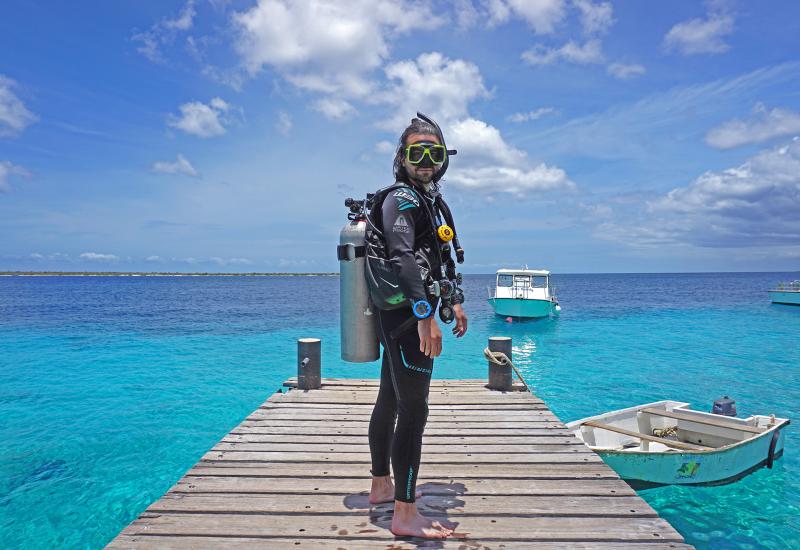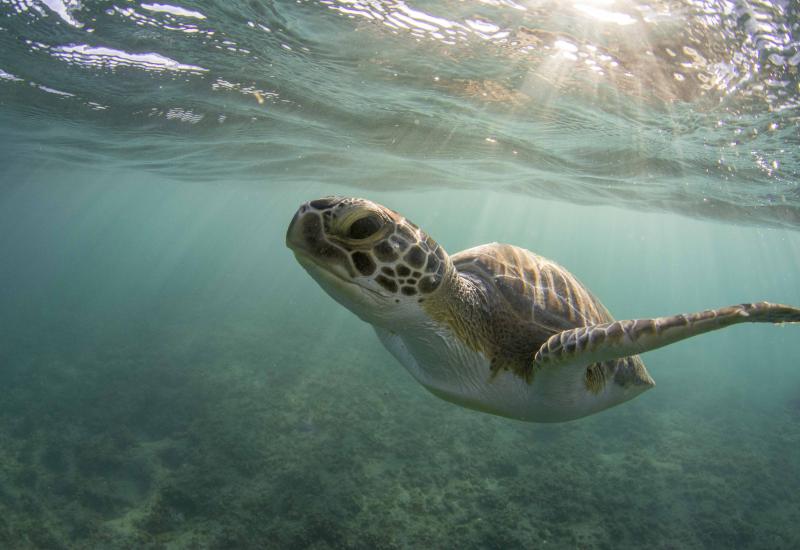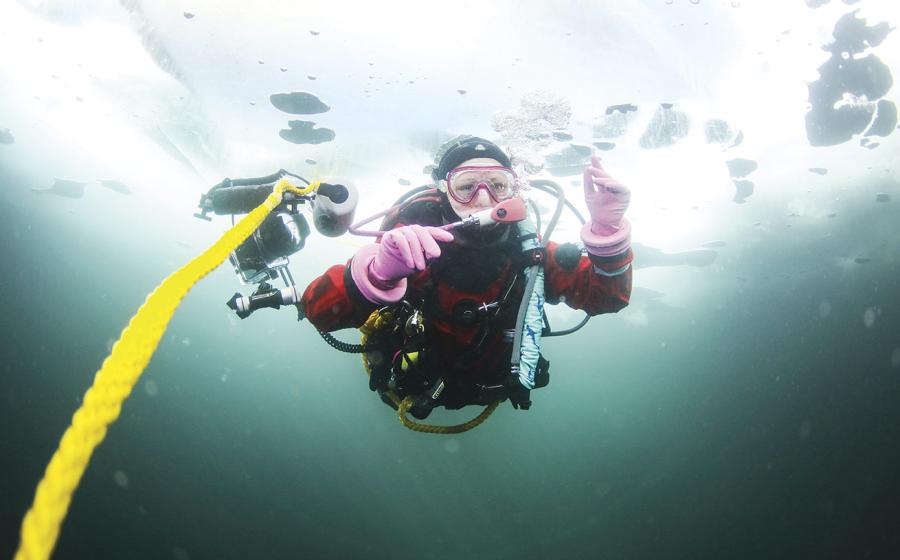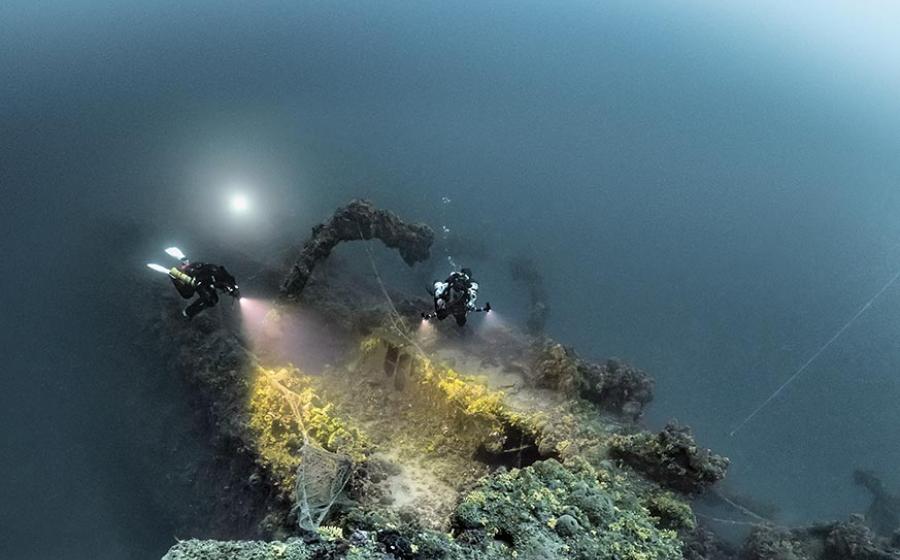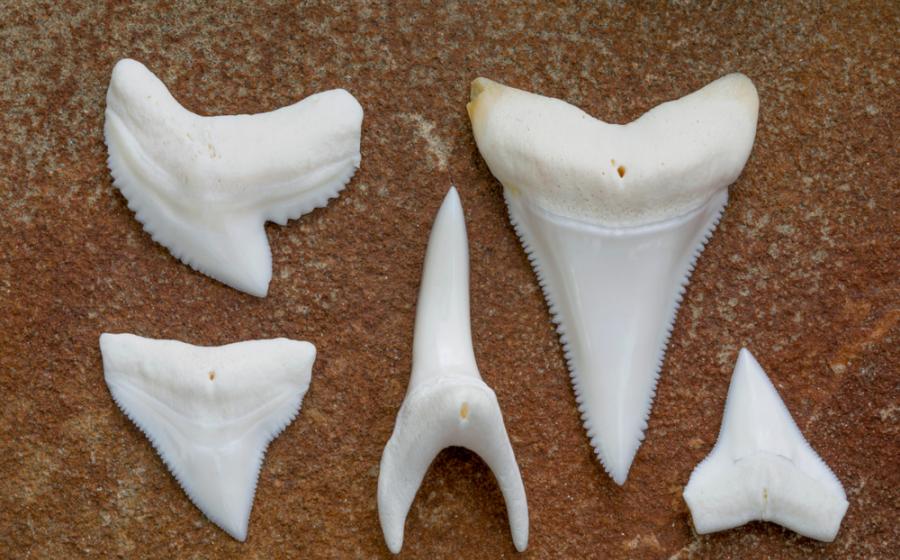Take a Friend Scuba Diving, Share the Fun
Want a new dive buddy? Get a friend, a spouse or even a child interested in diving and you won't be sorry. Like most things we do for fun, diving is even more enjoyable when it can be shared with someone else. When you can surface after a dive and say, "Wow! Wasn't that fantastic?" to a friend or loved one, the experience is even more memorable. In other words, introduce someone else to scuba diving and both of you will benefit.
How do you get from here to there? How do you instill the excitement you feel about diving in other people so that they want to get certified too? Preach the beauty and freedom of the underwater world by all means, but ultimately the motivation to dive has to come from them, not you. You can't force growth from barren ground, but if a seed is there, you can water and feed it. Here's how.
Accentuate the positive
Emphasize the warm water, the beautiful coral, the colorful fish, the feeling of weightless, effortless floating. Sharks, night dives and ripping currents are thrills for experienced divers, but maybe a little too thrilling for the novice--so save the hair-raising adventure tales for later. Remember that the ocean is an alien world for most people, and they carry many fears with them into the water. They don't need you to add to them. In the beginning, make sure the good stuff outweighs the bad stuff.
Back to basics
Can your friend swim? Don't assume; not everyone can. Being able to swim and, more important, feeling confident of not drowning, is the essential first step. Your friend may know how to swim, but not feel relaxed in the water. If he or she feels nervous just getting into the water, imagine the thought of going deep under the surface, dependent on a mechanical device for air.
So, first things first. If your friend doesn't feel entirely relaxed about going into the water, encourage him or her to join a health club or the YMCA and spend time in the pool until swimming is natural and stress-free. There will be plenty more stress to come, and your friend needs to start with as little as possible.
Start with snorkeling
"Snorkeling is an excellent way to get somebody interested in diving," says PADI instructor LeRoy Wickham. "They can see what's going on down there, and also get a little familiarity with some of the equipment."
Yes, it's just a mask, snorkel and fins, but don't underestimate the value to your friend of getting comfortable with them. They are what allow you to see, control your movements and breathe--pretty basic needs. And a snorkel introduces the feeling of breathing through a mouthpiece.
Don't underestimate the value of "seeing what's going on down there" either. Those of us who already dive tend to forget that the underwater world is invisible to the nondiver because the surface of the water reflects most of the light. The simple dive mask is the rabbit hole into that wonderland, and many nondivers become hooked by their first look at a reef through a dive mask.
Invest in a trip
If your friend's first underwater experience is going to be in a cold lake, quarry or swimming pool, don't expect him or her to get excited about doing it again. (Yes, it does happen sometimes, but you're bucking the odds.) Instead, get on a plane to the "little latitudes," where the palm trees sway and the water is clear and warm. Your friend can snorkel without exposure suit or weights, tasting diving at arguably its best, or anyway its easiest and most colorful. If you'll be there for more than a couple of days, pick a place where there's more to do than just dive; the whole trip needs to be fun.
Snorkel together much of the time so this is a shared experience, but you can go off scuba diving a little. That may sharpen your friend's desire to learn scuba and come along next time. During the trip, your friend may be motivated to ...
Take a "discover scuba" class
Every resort offers intro to scuba classes, though they're not really classes because there's no book work involved. Your friend won't have to figure out Boyle's Law. Instead, he or she will put on scuba gear and get underwater with the close supervision of an instructor. The dive will be short and shallow but enough to light a lifelong fire, assuming your friend is already comfortable in the water, familiar with snorkeling and eager for more.
Lavish praise
Pour on the "attaboys." Putting your head underwater and breathing through a straw for the first time is bound to be stressful, so be your friend's biggest cheerleader. He or she will have enough worries and doubts without you adding to them. Take care not to push the disapproval button.
Take baby steps
Don't try to push your friend to do too much too fast. You'll just leave the comfort zone and make the experience stressful instead of fun. Be patient, take it slow.
And take a break. Alternate underwater experiences with other activities so your friend has a chance to rest and absorb what he or she is learning. If you try to do too much, you risk task overload. You begin practicing mistakes.
Welcome some mistakes
"You want to see the new diver make mistakes," says Wickham. "We learn more from making mistakes than from doing everything right." And your friend will make mistakes at first--for instance, forgetting to clear the snorkel before trying to take a breath. This will be a vivid, even frightening experience, and your friend will be amply motivated not to repeat it without a lecture from you. Instead, you can do more good by confessing your own mistakes. Admitting that we all make them reassures your friend that he or she is not alone and really can do this.
Mute the criticism
If you feel you have to criticize your friend's performance, do it gently and privately. Resist the temptation to ridicule. Don't label your friend a rookie or "newbie." The diminutive of "newcomer," it is a putdown, not a term of endearment, and pushes your friend away when what you want to do is draw your friend in. High stress and personality demolition may make good Marines, but those folks can't quit once they've enlisted. Your friend can, will and probably should if you act this way. Remember your goal: to build up an equal you can share diving with, not to prop up your ego by tearing down someone else.
Choose an instructor
When your friend makes the decision to learn scuba diving, it's time to turn this over to a pro. You may think you know enough at least to get your friend started, but unless you're an instructor yourself, it's not a good idea. An instructor has training and experience in not only how to dive but how to teach. PADI? NAUI? SSI? Doesn't much matter. The instructor's experience and attitude are more important than the agency affiliation.
A low price for the course probably shouldn't be one of your prime criteria, nor should how quickly you can get certified. Dive skills take time to absorb, and a diver, like a pilot, shouldn't be in too much of a rush to solo.
Don't make deadlines
Goals are fine, but if it's a case of "You've got to finish the course next week because we've got a nonrefundable flight to Bonaire," you're putting unnecessary pressure on your friend and thereby increasing the odds of failure, not success.
Back off
When an instructor takes over, you should probably take off. It's tempting to tag along, get in the pool and "help." But your presence will make your friend's mistakes more embarrassing and dilute the instructor's authority. If you say, "That's not the way I learned it," your friend wonders who's right. You? The instructor? Nobody?
Celebrate
When your friend completes scuba certification, he or she will feel justifiably proud. Mark the occasion with a fancy dinner, a bottle of champagne or even better, a great dive trip. And keep the rewards coming. Don't let the C-card feel like the end of a process, but rather, let it be the beginning of shared adventures to come.
How To Interview a Dive Instructor
Insist on speaking to the instructor personally, not just to the owner of the dive shop. Ask lots of questions: How big will the class be? Will there be an assistant instructor too? If you have trouble with a skill, can you have extra sessions? If you've got special worries--claustrophobia, sharks--be frank about them. A good instructor will have ways to help you deal with them.
Pay attention not only to the content of the instructor's answers but how they are delivered. You want someone who speaks clearly and calmly, who's organized, and who's patient with having to explain it all again. Look for a good feeling about the instructor, a personal connection, some warmth.
And the most important question: Can you observe a class? By standing on the pool deck or the beach, watching and listening, you'll learn the most about the instructor. Do the students seem confident and relaxed or confused and nervous?

ShutterstockShare your passion for diving with family and friends.
Want a new dive buddy? Get a friend, a spouse or even a child interested in diving and you won't be sorry. Like most things we do for fun, diving is even more enjoyable when it can be shared with someone else. When you can surface after a dive and say, "Wow! Wasn't that fantastic?" to a friend or loved one, the experience is even more memorable. In other words, introduce someone else to scuba diving and both of you will benefit.
How do you get from here to there? How do you instill the excitement you feel about diving in other people so that they want to get certified too? Preach the beauty and freedom of the underwater world by all means, but ultimately the motivation to dive has to come from them, not you. You can't force growth from barren ground, but if a seed is there, you can water and feed it. Here's how.
Accentuate the positive
Emphasize the warm water, the beautiful coral, the colorful fish, the feeling of weightless, effortless floating. Sharks, night dives and ripping currents are thrills for experienced divers, but maybe a little too thrilling for the novice--so save the hair-raising adventure tales for later. Remember that the ocean is an alien world for most people, and they carry many fears with them into the water. They don't need you to add to them. In the beginning, make sure the good stuff outweighs the bad stuff.
Back to basics
Can your friend swim? Don't assume; not everyone can. Being able to swim and, more important, feeling confident of not drowning, is the essential first step. Your friend may know how to swim, but not feel relaxed in the water. If he or she feels nervous just getting into the water, imagine the thought of going deep under the surface, dependent on a mechanical device for air.
So, first things first. If your friend doesn't feel entirely relaxed about going into the water, encourage him or her to join a health club or the YMCA and spend time in the pool until swimming is natural and stress-free. There will be plenty more stress to come, and your friend needs to start with as little as possible.
Start with snorkeling
"Snorkeling is an excellent way to get somebody interested in diving," says PADI instructor LeRoy Wickham. "They can see what's going on down there, and also get a little familiarity with some of the equipment."
Yes, it's just a mask, snorkel and fins, but don't underestimate the value to your friend of getting comfortable with them. They are what allow you to see, control your movements and breathe--pretty basic needs. And a snorkel introduces the feeling of breathing through a mouthpiece.
Don't underestimate the value of "seeing what's going on down there" either. Those of us who already dive tend to forget that the underwater world is invisible to the nondiver because the surface of the water reflects most of the light. The simple dive mask is the rabbit hole into that wonderland, and many nondivers become hooked by their first look at a reef through a dive mask.
Invest in a trip
If your friend's first underwater experience is going to be in a cold lake, quarry or swimming pool, don't expect him or her to get excited about doing it again. (Yes, it does happen sometimes, but you're bucking the odds.) Instead, get on a plane to the "little latitudes," where the palm trees sway and the water is clear and warm. Your friend can snorkel without exposure suit or weights, tasting diving at arguably its best, or anyway its easiest and most colorful. If you'll be there for more than a couple of days, pick a place where there's more to do than just dive; the whole trip needs to be fun.
Snorkel together much of the time so this is a shared experience, but you can go off scuba diving a little. That may sharpen your friend's desire to learn scuba and come along next time. During the trip, your friend may be motivated to ...
Take a "discover scuba" class
Every resort offers intro to scuba classes, though they're not really classes because there's no book work involved. Your friend won't have to figure out Boyle's Law. Instead, he or she will put on scuba gear and get underwater with the close supervision of an instructor. The dive will be short and shallow but enough to light a lifelong fire, assuming your friend is already comfortable in the water, familiar with snorkeling and eager for more.
Lavish praise
Pour on the "attaboys." Putting your head underwater and breathing through a straw for the first time is bound to be stressful, so be your friend's biggest cheerleader. He or she will have enough worries and doubts without you adding to them. Take care not to push the disapproval button.
Take baby steps
Don't try to push your friend to do too much too fast. You'll just leave the comfort zone and make the experience stressful instead of fun. Be patient, take it slow.
And take a break. Alternate underwater experiences with other activities so your friend has a chance to rest and absorb what he or she is learning. If you try to do too much, you risk task overload. You begin practicing mistakes.
Welcome some mistakes
"You want to see the new diver make mistakes," says Wickham. "We learn more from making mistakes than from doing everything right." And your friend will make mistakes at first--for instance, forgetting to clear the snorkel before trying to take a breath. This will be a vivid, even frightening experience, and your friend will be amply motivated not to repeat it without a lecture from you. Instead, you can do more good by confessing your own mistakes. Admitting that we all make them reassures your friend that he or she is not alone and really can do this.
Mute the criticism
If you feel you have to criticize your friend's performance, do it gently and privately. Resist the temptation to ridicule. Don't label your friend a rookie or "newbie." The diminutive of "newcomer," it is a putdown, not a term of endearment, and pushes your friend away when what you want to do is draw your friend in. High stress and personality demolition may make good Marines, but those folks can't quit once they've enlisted. Your friend can, will and probably should if you act this way. Remember your goal: to build up an equal you can share diving with, not to prop up your ego by tearing down someone else.
Choose an instructor
When your friend makes the decision to learn scuba diving, it's time to turn this over to a pro. You may think you know enough at least to get your friend started, but unless you're an instructor yourself, it's not a good idea. An instructor has training and experience in not only how to dive but how to teach. PADI? NAUI? SSI? Doesn't much matter. The instructor's experience and attitude are more important than the agency affiliation.
A low price for the course probably shouldn't be one of your prime criteria, nor should how quickly you can get certified. Dive skills take time to absorb, and a diver, like a pilot, shouldn't be in too much of a rush to solo.
Don't make deadlines
Goals are fine, but if it's a case of "You've got to finish the course next week because we've got a nonrefundable flight to Bonaire," you're putting unnecessary pressure on your friend and thereby increasing the odds of failure, not success.
Back off
When an instructor takes over, you should probably take off. It's tempting to tag along, get in the pool and "help." But your presence will make your friend's mistakes more embarrassing and dilute the instructor's authority. If you say, "That's not the way I learned it," your friend wonders who's right. You? The instructor? Nobody?
Celebrate
When your friend completes scuba certification, he or she will feel justifiably proud. Mark the occasion with a fancy dinner, a bottle of champagne or even better, a great dive trip. And keep the rewards coming. Don't let the C-card feel like the end of a process, but rather, let it be the beginning of shared adventures to come.
How To Interview a Dive Instructor
Insist on speaking to the instructor personally, not just to the owner of the dive shop. Ask lots of questions: How big will the class be? Will there be an assistant instructor too? If you have trouble with a skill, can you have extra sessions? If you've got special worries--claustrophobia, sharks--be frank about them. A good instructor will have ways to help you deal with them.
Pay attention not only to the content of the instructor's answers but how they are delivered. You want someone who speaks clearly and calmly, who's organized, and who's patient with having to explain it all again. Look for a good feeling about the instructor, a personal connection, some warmth.
And the most important question: Can you observe a class? By standing on the pool deck or the beach, watching and listening, you'll learn the most about the instructor. Do the students seem confident and relaxed or confused and nervous?


